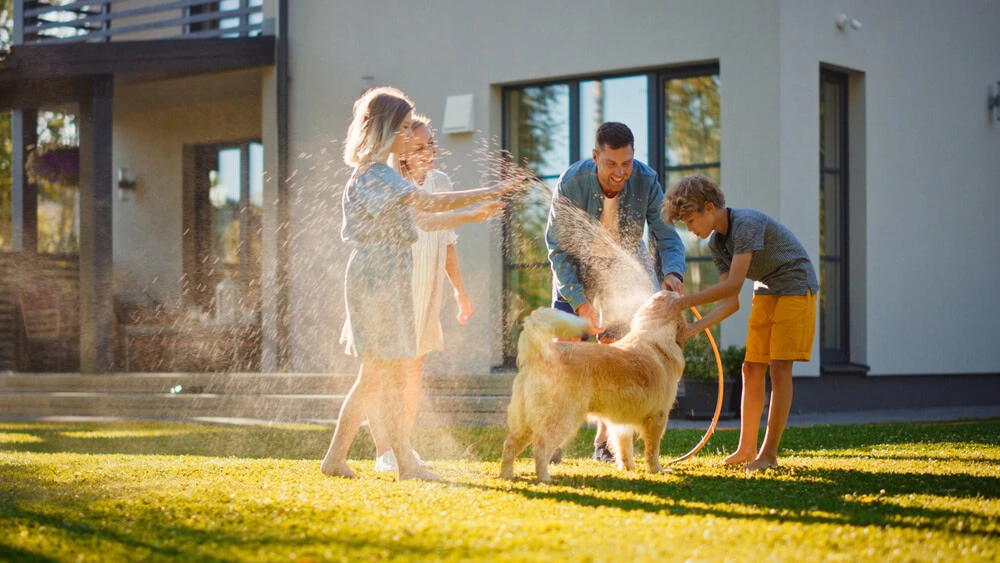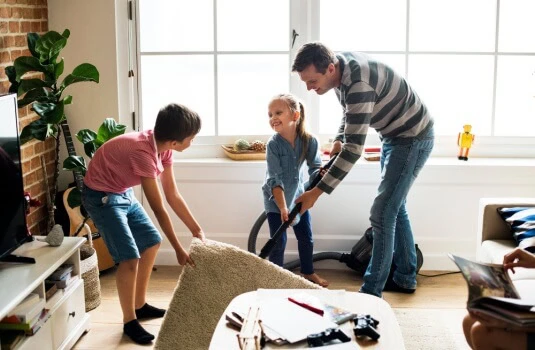
Georgia summers are long, lazy, and wonderful. Summer days stretch ahead with plenty of indoor and outdoor activities for all. But the lifestyle can also mean risks associated with pools and fires, bikes, sports, and a whole host of adventures. The kids are on school break and constantly looking for things to do that don’t involve cleaning their bedrooms. Preparation is the key to a carefree summer. Start by having the right level of homeowners insurance to protect your family’s finances and your peace of mind.
It can be a truly nostalgic and unforgettable three or four months, but only if you all stay safe around the house and beyond. Follow these home summer safety tips for a safe and playful Peach State summer at home for you and your loved ones.
Embracing Summer With a Secure Home and Essential Outdoor Safety Measures
The kids seem safer during the winter months, giving you fewer concerns. That’s because they’re not quite so adventurous during the colder months.
Even in balmy Georgia, they bundle up when they go outside and spend more time indoors, in front of computer and TV screens. Those might not be your preferred activities for them, but you’re pretty sure they won’t get hurt.
In the summertime, they tend to go farther away and stay out of your sightline for longer periods of time. They’re everywhere, so drivers have to follow safety tips, driving carefully when backing out of driveways and cruising through residential streets.
The kids wear shorts and short sleeves, so their knees can get skinned, and sunburns are all too common. Bikes crash, and skateboards stumble.
Here are some common areas of concern and summer safety tips to confront them.
Safe Swimming Pool Practices
It’s vital that you and your kids know the important summer pool safety tips that might save lives. Start by signing them up for swimming lessons when they are as young as two or three and keeping them enrolled in classes until you feel confident they know their way around deep water.
Do you have a pool in your backyard? It should have a fence around it with a gate that stays closed—and locked—except when the kids have permission to swim and there is an adult present. If your children have friends with backyard pools, caution them to only swim there when an adult is around.
If you live in an apartment, don’t allow your children to swim in the pool unless they are supervised by an adult.
If you’re taking the kids and their friends to a community pool, you might have a bunch of young ‘uns under your control. Now throw them in a pool with dozens of other kids, and watch how quickly you lose sight of them.
Make all the young ones partner up with friends or siblings so they can help you keep track of everyone. Make sure they know where the deep end is and where they can and can’t go based on their swimming abilities. If they can’t swim, make sure they have water wings.
Also, lather the kids up with sunscreen before the outing. The combination of water and glaring white pavement can attract solar rays that can be quite painful without a protective layer of lotion. Reapply coats of sunscreen periodically as the kids come out of the pool.
Grilling and Fire Pit Protocol
There are few summertime activities more memorable than sitting around a campfire and watching the sun go down. Or grilling hot dogs and barbecuing chicken over a smoldering flame. Just remember—no one handles matches or starts fires except mom, dad, or the older kids. That should be rule number one when the family is picnicking in the park or grilling at home.
Youngsters, after all, are mesmerized by fire—they love it. That’s why you have to keep an eye on them at all times and make sure they don’t get too close to flames or fall victim to thrown sparks.
Set a good example when it comes to backyard fire safety. Never start your fire with flammable liquids like propane or gasoline. Let your children know that starting and tending a fire is serious business and that your fire pit is not a play toy.
Some of these same summer safety tips concerning fire come into play around the Fourth of July, when sparklers suddenly become must-have possessions. Watch your kids closely, make sure their fire-waving play never endangers others, and don’t let them run around the yard with the sparks a-flyin’.
Protect Your Interior From Summer Threats
It’s not just the great outdoors that can present seasonal risks to you and your loved ones. Things can go on inside, too, which is why you need to heed these home safety tips for a safe summer.
Keeping Out Pests
The subject here isn’t your kids’ more obnoxious friends. It’s the real pests that seem to spring to life when winter turns to spring and then to summer.
Ice cream, soda pop, and sticky, sugary treats have been mainstays of the hot season since you were a kid. They still are. And today’s kids are no more neat and careful in the kitchen than you were. Their sweet little messes can draw ants, mice, and other small (or not-so-small) pests.

To keep the house as free of unwanted guests as possible, restrict the kids to the kitchen or the outdoors when it comes to snack time. Train them to thoroughly clean up after themselves, or do it for them if they’re too young to do the job right (and that can include teenagers). Don’t let dirty dishes sit for long, and keep countertops and other surfaces wiped clean.
This is partly an outdoor job, too. Your summer home maintenance tasks should include trimming tree limbs and shrubbery away from the roofline so squirrels, raccoons, and other pestilent climbers can’t use them to get to your roof, down your chimney, and into your house.
Shielding Your Home Against Summer Storms
Fierce winds and driving rain are not unheard of during Peach State summers. Tornadoes and even hurricane winds can cause plenty of risk to your home and family here.
Stay tuned to weather reports so you’re never caught by surprise by an approaching storm. Make sure the kids are safely inside before one strikes, and you don’t have loose lawn furniture, toys, bikes, or other objects in your yard that could become flying missiles during heavy winds.
And finally, inspect your home carefully once the weather has cleared. Take photos of broken roof singles or other serious damage, and file a report with your homeowners insurance agent.
Preventing Burglaries While Away on Vacation
Not all home invaders are insects and rodents. Summertime is vacation time, and a week or two away can provide ample time and opportunity for unwanted guests of the human variety. That’s not a reality you want to return home to after time at the beach. So, take in these home safety tips for summer vacations.
Tell your kids not to put the word out that the family will be away. Only tell a trusted neighbor or two so they know there shouldn’t be signs of activity at your place while you’re gone. If you or younger family members have social media accounts (and the kids certainly do), don’t let them post vacation photos until you get back.
Leave the lights on so the home looks occupied. If you have smart lighting, you can turn lights on and off at appropriate times during the day and evening so your home looks active. If you have smart security cameras, you can keep an eye on the place from your phone wherever you are and whenever you want.
Do you live in a Georgia community with a responsive police force? If so, let them know when you’ll be away and ask for an occasional drive-by. The mere sight of a slow-moving police car can frighten away and keep away those who might be up to no good.
Staying Cool and Safe During Heat Waves
Yes, it does indeed get hot and humid during Peach State summers, especially the farther south you live. Plenty hot and plenty humid. Climate change might make those heat waves even more harsh and frequent. Georgians can stay thrifty and energy-efficient by opening windows and running fans during the summer months. But when temperatures soar into the 90s, and the humidity is drenching, it’s time to turn on the air conditioning or fire up the fans.
If you don’t have AC, make use of public spaces that do, especially during the hottest afternoon hours. The days when you can fry eggs on the sidewalks are good times to take the kids out for ice cream or spend afternoons at the mall, a movie theater, or the public pool.
The very young and the elderly can be particularly sensitive to heat and humidity. If your community makes municipal buildings or other spaces available as cool retreats during the worst days of the season, take advantage if you or others are impacted.
Don’t let the kids overdo it while biking and running around outside when it’s particularly sticky, and make sure they take frequent water breaks or run a hose over them. They might be the last to notice the heat, but they can dehydrate quickly.